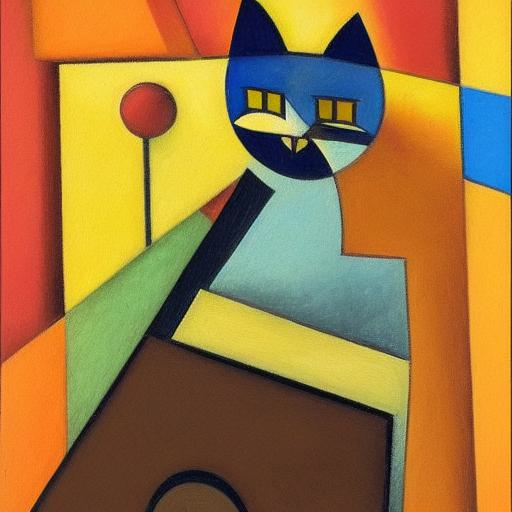How to write this prompt?
Here is a breakdown of each element in the prompt and how it contributes to the final image:
- “Earthy tone”: This sets a specific color palette for the image, suggesting that the colors used should be natural and muted.
- “Cubism painting of a beautiful cat sitting at a table with fruit trees”: This provides a specific visual reference for the artist to work with, suggesting that the image should feature a cat, a table, and fruit trees as the central focus. The use of cubism suggests that the image should be created in a highly stylized and abstract way.
- “A cubist painting by Bernard Accama“: This provides a specific reference for the artist to review and gather inspiration from. It also suggests that the image should be created in a cubist painting style, which emphasizes geometric shapes and abstract forms.
- “Tumblr”: This keyword suggests that the image should be created with social media in mind and should be visually striking and shareable.
- “Figurative art”: This provides a general theme for the image and suggests that it should feature recognizable figures or objects.
- “Cubists love it”: This suggests that the image should appeal to fans of cubist art and should be created with a high level of skill and attention to detail.
- “Cubist painting”: This emphasizes the style in which the image should be created and suggests that the final product should be a cubist painting or illustration.
- “Picasso style”: This provides a specific reference to the work of Pablo Picasso, who was one of the most famous practitioners of cubism. This suggests that the image should be created in a style similar to Picasso’s work, which is known for its bold colors, dynamic shapes, and abstract forms.
Each individual part of the prompt contributes to the overall image being generated. By considering each element carefully, artists and designers can create a highly specific and detailed image that meets the needs of their project or campaign. In this case, the prompt suggests the creation of a cubist painting featuring a cat, a table, and fruit trees in an earthy color palette.
What is the history of cubism in art?
Cubism is a modern art movement that originated in Paris in the early 20th century. It was pioneered by artists such as Pablo Picasso and Georges Braque, and is characterized by its use of geometric shapes, fragmented forms, and multiple perspectives. Cubism was an important influence on many subsequent art movements, including futurism, surrealism, and abstract expressionism.
How to create a cubist painting of a cat?
To create a cubist painting of a cat, start by sketching out the basic composition of the painting, including the cat, the table, and the fruit trees. Then, use geometric shapes and fragmented forms to create a sense of depth and perspective in the painting. Finally, use bold colors and dynamic shapes to create a sense of movement and energy in the image.
Why is figurative art popular in social media?
Figurative art is popular in social media because it often features recognizable subjects or objects, which can be easily shared and appreciated by a wide audience. Additionally, figurative art can be used to explore a wide range of themes and emotions, from joy and celebration to pain and suffering. The use of social media as a platform for figurative art can help to democratize the art world and make it more accessible to a wider audience.
Are there any copyright issues with using AI-generated art?
The legal and copyright issues surrounding AI-generated art are complex and are still being debated and clarified by lawmakers and legal experts. However, it’s important to note that AI-generated art is typically created using pre-existing data, such as images or text, and may involve copyrighted material. As such, there may be copyright issues associated with using or selling AI-generated art.
In general, it’s important to consider the ownership and copyright status of any data used in the creation of AI-generated art, as well as any intellectual property rights associated with the underlying algorithms or software used to generate the art. Additionally, it’s important to consider the ethical implications of using AI to create art, and to ensure that any use or sale of AI-generated art does not infringe on the rights of others or otherwise violate ethical standards.
Can I sell AI-generated art?
If you are considering using or selling AI-generated art, it’s recommended that you consult with a legal expert or intellectual property specialist to ensure that you are complying with all relevant laws and regulations, and to avoid any potential legal issues or liabilities.
Visual Paradigm Online is a powerful design tool that enables users to seamlessly integrate AI-generated art into their graphic designs, resulting in visually stunning and engaging graphics with just a few clicks. With its user-friendly interface and an extensive collection of design templates and assets, Visual Paradigm Online offers a convenient and effortless way to experiment with various styles and layouts until you achieve the perfect combination for your project.


